2016年自考英语二教材课文讲义unit6
自考英语二 课后练习答案 Unit 6 课后练习答案
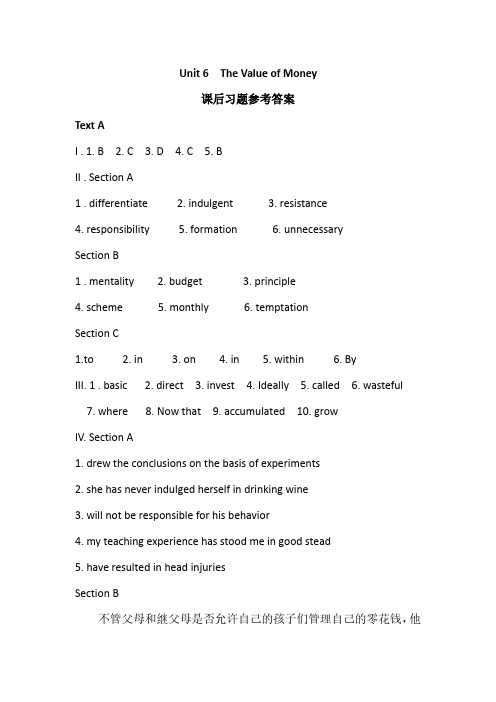
Unit6The Value of Money课后习题参考答案Text AI.1.B 2.C 3.D 4.C 5.BII.Section A1.differentiate2.indulgent3.resistance4.responsibility5.formation6.unnecessarySection B1.mentality2.budget3.principle4.scheme5.monthly6.temptationSection C1.to2.in3.on4.in5.within6.ByIII.1.basic 2.direct 3.invest 4.Ideally 5.called 6.wasteful 7.where8.Now that9.accumulated10.growIV.Section A1.drew the conclusions on the basis of experiments2.she has never indulged herself in drinking wine3.will not be responsible for his behavior4.my teaching experience has stood me in good stead5.have resulted in head injuriesSection B不管父母和继父母是否允许自己的孩子们管理自己的零花钱,他们都会从预算中拨出一笔现金,来满足孩子们的日常需要和需求。
小孩不需要大量的钱,不过,他们最好有足够的钱,以便他们能学会如何花钱和存钱。
为了让孩子们学习花钱的重要性,许多父母会让孩子们把钱至少分成三份:一份用来紧急支出,一份用作短期储蓄(外出旅行、购买电子游戏产品等),还有一份用作长期储蓄(买车、上大学等)。
某些家庭还增加了第4项规划,即捐款,让孩子们从帮助那些不幸的人们的经历中体会人生的价值和重要意义。
Unit6:thevalueofmoney(自考英语2)解读
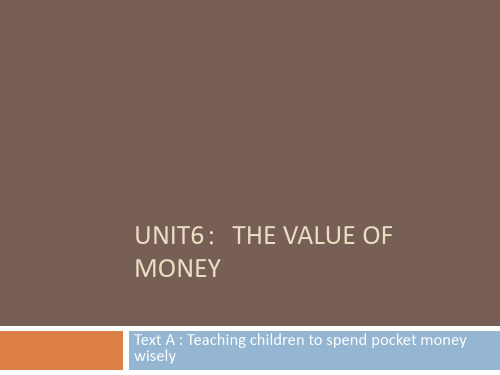
New words
•differentiate v. 区分;区别;辨别 I've learned to differentiate a French wine from a Chinese wine. •Differ vt. 使…相异;使…不同 Each writer's style differs from that of another. Her husband always differs with her. •Different adj. 不同的;个别的,与众不同的 Now it is different from the past. Foreign countries have a different way of life from ours. •Difference n. 差异;不同;争执 There is a world of difference between the two. It's difficult to level down the notable difference Between the two.
New words
• overspend v. 花钱过多;比(预计的)花得多; 超支;注意over- / out-的区别: overeat vt. 使吃过量; vi. 吃得过多 outeat vt. 吃得比…多 overdo vt.把…做得过分 vi. 做得过分;表演过火 Outdo vt. 超过;胜过 oversleep vt. 使睡过头 vi. 睡过头 outlive vt. 比…活得长;比…经久 overweight adj. 超重的;过重的; n. 超重 Outweigh vt. 比…重(在重量上);比…重要; 比…有价值
New words
自考综合英语(二)下册详解第六课下
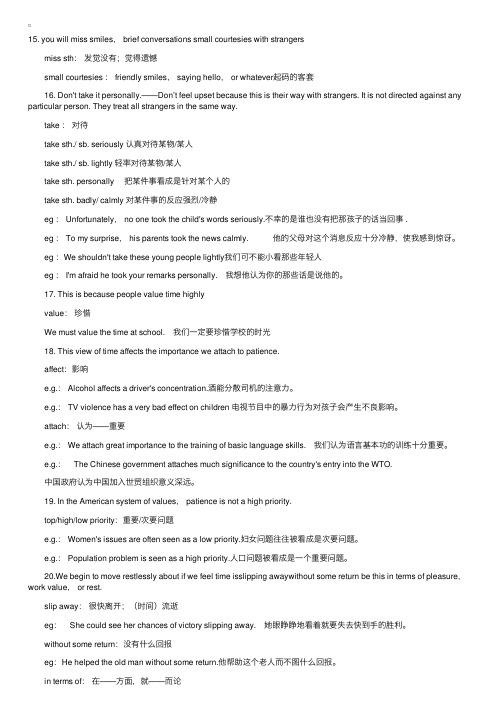
15. you will miss smiles, brief conversations small courtesies with strangers miss sth:发觉没有;觉得遗憾 small courtesies : friendly smiles, saying hello, or whatever起码的客套 16. Don't take it personally.——Don’t feel upset because this is their way with strangers. It is not directed against any particular person. They treat all strangers in the same way. take :对待 take sth./ sb. seriously 认真对待某物/某⼈ take sth./ sb. lightly 轻率对待某物/某⼈ take sth. personally 把某件事看成是针对某个⼈的 take sth. badly/ calmly 对某件事的反应强烈/冷静 eg : Unfortunately, no one took the child's words seriously.不幸的是谁也没有把那孩⼦的话当回事 . eg : To my surprise, his parents took the news calmly. 他的⽗母对这个消息反应⼗分冷静,使我感到惊讶。
eg :We shouldn't take these young people lightly我们可不能⼩看那些年轻⼈ eg : I'm afraid he took your remarks personally. 我想他认为你的那些话是说他的。
17. This is because people value time highly value:珍惜 We must value the time at school. 我们⼀定要珍惜学校的时光 18. This view of time affects the importance we attach to patience. affect:影响 e.g.: Alcohol affects a driver's concentration.酒能分散司机的注意⼒。
自考英语2课件Unit6TextB

anger buried deep in the subconscious
--adj.
a subconscious fear of failure our subconscious desires
--conscious, unconscious
I became conscious of someone watching me.
They are greedy for profits.
--greed
strong desire for more food, money, power, possessions etc than you need:
people motivated by jealousy and greed
LOGO
abundant
an abundant supply of fresh water abundant opportunities for well qualified staff
--n. abundance
There was an abundance of corn last year. At the party there was food in abundance.
LOGO
originally
The family originally came from France. We originally intended to stay for just a few days. Originally, we had planned a tour of Scotland but we didn't go in the end. a. original The land was returned to its original owner. The original plan was to fly out to New York. n. origin a new theory to explain the origins of the universe
自考英语二Unit 6 The Value of Money
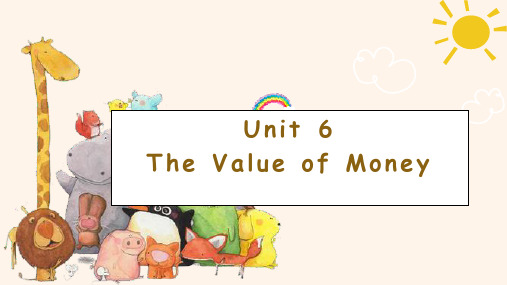
difbufsefraeren车t费ways. Some give a lump opfockseut衣m袋a子t the beginning of a
Phrases and Expressions
on a daily basis每日地 result in导致 pay off付清,偿清 within one’s means量入为出 stand ... in good stead(需要时)对某人有用,对某人有利
II. Text A Teaching Children to Spend
V. Exercises
A Famous Quote名言 Never spend your money before you have it.
------Thomas Jefferson 钱财未到手,绝不提前花。
------托马斯·杰斐逊
Thomas Jefferson (1743-1826), the third President of the United States and the primary author of the Declaration of Independence.
8. constraint /kənˈstreɪnt/ n.限制,限定,约束 constrain /kənˈstreɪn/ v. 限制,约束;强迫,迫使 9. budget /ˈbʌdʒɪt/ v.谨慎花钱,把...编入预算 10. overindulge /ˌəʊvərɪnˈdʌldʒ/ v.过多地享用(尤指食物或饮料) indulge /ɪnˈdʌldʒ/ v. 沉湎;纵容;满足;参加(尤指违法活动) 11. short-sighted /ˌʃɔːt ˈsaɪtɪd/ adj.目光短浅的,没有远见的
2016年自考英语二教材课文讲义unitWord版
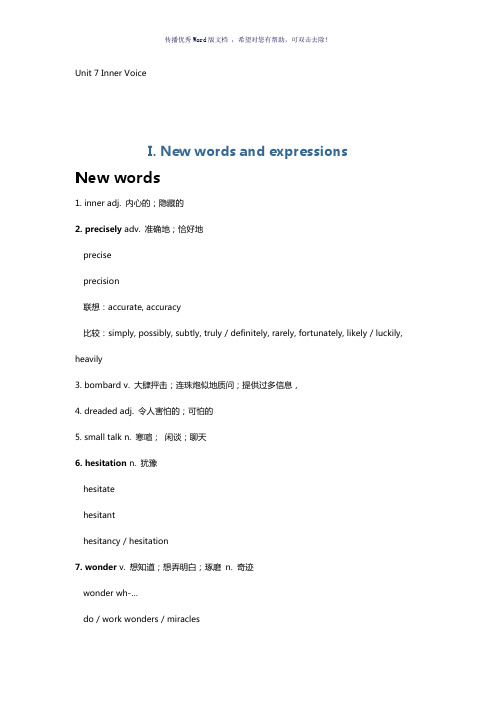
Unit 7 Inner VoiceI. New words and expressionsNew words1. inner adj. 内心的;隐藏的2. precisely adv. 准确地;恰好地preciseprecision联想:accurate, accuracy比较:simply, possibly, subtly, truly / definitely, rarely, fortunately, likely / luckily, heavily3. bombard v. 大肆抨击;连珠炮似地质问;提供过多信息,4. dreaded adj. 令人害怕的;可怕的5. small talk n. 寒喧;闲谈;聊天6. hesitation n. 犹豫hesitatehesitanthesitancy / hesitation7. wonder v. 想知道;想弄明白;琢磨n. 奇迹wonder wh-…do / work wonders / miracles8. prompt v. 促使;导致;激起9. complete adj. (用以强调)完全的,彻底的10. upset adj. 难过的;不高兴的;沮丧的11. roll v. (使)翻滚,滚动12. despite prep. 即使;尽管despite / in spite of that fact that …13. feeble adj. 无效的;无力的14. attempt n./ v. 企图;试图;尝试attempted15. wipe v.(用布、手等)擦干净,抹掉16. profusely adv. 大量地;连连地17. address v. 写(收信人)姓名地址;致函18. receptionist n. 接待员19. attach v. 把…固定,把…附(在…上)attach …to…attached 依恋的;附加的;附属的attachment 依恋;附件20. emotion n. 强烈的感情;情感;情绪emotionalemotionless21. contain v. 控制,克制,抑制(感情)22. apparently adv. 据…所知;看来;显然23. overwhelming adj. 巨大的;压倒性的;无法抗拒的overwhelming problemsan overwhelmed person联想:surprised / surprisingexcited / excitingamazed / amazingdisappointed / disappointingfrightened / frighting注意:excited eyes / expressions / looks24. scream v. 高声喊,大声叫Phrases and Expressions1. be lost in one's thought陷入沉思2. break down 失败3. come up with找到(答案等);想出4. drop…off (顺路)把…放下5. take one's own life自杀6. in desperation 在绝望中;走投无路7. care about sb. 关心;关怀8. take a chance 冒险9. make a difference 有作用;产生影响II. Text LearningYour Inner Voice①(1)My day started just like all the other days for the past 15 years where I get up, make some coffee, shower, get dressed and leave for the train station at precisely 7:35 A.M. to arrive at work by 8:30. While on the train I would always choose a seat away from the crowd so I can read the newspaper in peace and quiet. (2)At work I am always being bombarded with questions from coworkers, suppliers, telephone and then those dreaded meetings, so the last thing I need is some stranger to sit beside me and make small talk.本部分重点及难点:1. My day started just like all the other days for the past 15 years where I get up, make some coffee, shower, get dressed and leave for the train station at precisely 7:35 A.M. to arrive at work by 8:30.(1) where引导定语从句,先行词为days。
Unit6:the value of money(自考英语2)
Key sentences
5. This habit of borrowing causes them to depend on others to solve their problems. (1) cause sb. to do sth.使某人做某事 (2) depend / rely on sb. to do sth.依赖/依靠某人做某事 注意depend的派生词:dependent (on/upon) dependence (on/upon) independent (of) Independence Day 类似用法的结构:wait for sb. to do sth. call on sb. to do sth.号召某人干某事;请某人干某事 look to sb. to do sth. / for sth. 指望某人做某事
UNIT6:THE VALUE OF MONEY
Text A : Teaching children to spend pocket money wisely
New words
• allocate v. 拨(给);划(给);分配(给) The Government has allocated funds for housing. allocate for 为…而分配;把…拨给 The Government allocated money for the memorial. •unnecessarily adv. 没必要地 I think that is because we unnecessarily complicate it. necessarily adv. 必要地;必定地,必然地 That’s not necessarily a bad thing
自考英语(二)课文(第六单元)
Unit 7T ext AFamilies“Family”_ the word has different meanings f or different people, and even the di ctionary gives us sev eral definitions: “a group of people related by blood or marriage,’’“two adults and their children,’’“ all those people descended f rom a common ancestor,’’“ a household,’’ and so on. Some people think of a family as a mother, a father, and their children; others include grandparents, aunts, uncles, and cousins. For some of us, family means the group of relatives living far away from home. For others, having a family simply means having children. Some f amilies have long histories, while others know very little about their ancestors. No matter if it is young or old, large or small, traditional or modern, every f amily has a sense of what a f amily is. It is that f eeling of belonging, of love and security that comes f rom living together, helping and sharing.There are basically two types of families: nuclear families and extended f amilies. The nuclear family usually consists of two parents (mother and f ather) and thei r children. The mother and f ather f orm the nucleus, or cent er, of the nuclear family. The children stay in the nuclear f amily until they grow up and marry. Then they f orm new nuclear families.The extended f amily is very large. There are of t en many nuclear families in one extended f amily. An extended f amily includes children, parents, grand-parents, uncles, aunts, and cousins. The members of an extended f amily are related by blood (grandparents, parents, children, brothers, sisters, etc.) or by marriage (husbands, wives, mothers-in-law, etc.). They are all related, so the members of an extended f amily are called relatives.Traditionally, all the members of an extended family lived in the same area. However, with the change from an agricultural to an industrial society, many nuclear families moved away from the f amily home in order to f ind work. In industrial societies today, the members of most nuclear families live together, but most extended f amilies do not live together. Theref ore we can say that the nuclear family becomes more important than the extended f amily as the society industrializ es: In post-industrial societies like the United States, even the nuclear f amily is changing. The nuclear family is becoming smaller as parents want f ewer children, and the number of childless families is increasing. Traditionally, the f ather of a nucl ear family earned money f or the family while the mother cared for house and the children. Today, more than 50% of the nuclear f amilies in the United States are two-earner families_ both the f ather and the mother earn money f or the f amily_ and in a f ew families the mother earns the money while the f ather takes care of the house and the children. Many nuclear f amilies are also “splitting up’’ _ more and more parents are getting divorced.What will be the result of this “ splitting”of the nuclear f amily? Social scientists now talk of two new f amily f orms: the single parent f amily and the remarried f amil y. Almost 20% of all American f amilies are single parent f amilies, and in 85% of these f amilies the single parent is the mother.Most single parents f ind it very dif f i cult to take care of a f amily alone, so they soon marry again and f orm remarried f amilies. As social scientists study these two new f amily f orms, they will be able to tell us more about the f uture of the nuclear family in the post-industrial age. (565 words) (3) (23)T ext BThe Changing American FamilyThe f amily is important to people all over the world although the structure of the family is quite different from one count ry to another. In the United States, as in many countries in the world, the f amily is changing. A generation or two ago, the traditional f amily, in which the f ather was boss, was customary. Now the modern f amily, in which both the f ather and the mother are equal partners, is more common. Although there are several similarities between the traditional and the modern f amily, there are also some very important diff erences.The traditional f amily of yesterday and the modern f amily of today have several similarities. The traditional f amily was a nuclear f amily, and the modern f amily is, too. The role of the father in the traditional f amily was to provide f or his f amily. Similarly, the f ather in the modern family is expected to do so, also. The mother in the traditional family took care of the children’s physical and emotional needs just as the modern mother does.On the other hand, there are some great diff erences between the traditional f amily and the modern f amily. The f irst important dif ference is in the man’s role. The traditional husband was the head of the household, because he was the only one who worked outside the home. If the wi f e worked f or pay, then the husband was not considered to be a good provider. In many f amilies today, both husband and wif e work f or pay. Theref ore, they share the role of head of household. In addition, the traditional husband usually made the big decisions about spending money. However, the modern husband shares these decisions with his working wi fe. Also, the traditional husband did not help his wif e with the housework or m eal preparation. Dinner was ready when he cam e home. In contrast, the modern husband helps his working wife at home. He may do some of the household jobs, and it is not unusual f or him to cook.The second diff erence is in the woman’s role. In the traditional f amily, the woman may have worked f or pay during her f irst years of marriage. However, af ter she becam e pregnant, she would usually give up her job. Her primary role was to take care of her family and home. In contrast, in many f amilies today, the modern woman works outside the home even af ter she has children. She’s doing two jobs instead of one, so she is busier than the traditional mother was. The traditional wif e learned to live within her husband’s income. On the other hand, the modern wif e does not have to because the f amily has two incomes.The f inal difference is in the role of the children. In the traditional f amily, the children were taken care of by the mother because she did not work outside the home. However, today preschool children may go to a child care center or to a baby-sitter regularly because the mother works. The school-age children of a traditional f amily were more dependent. Their mother was there to help them to get ready f or school and to make their breakfast. In contrast, modern children are more independent. They have to get up early in the morning and get ready f or school. Their mother is busy getting ready f or work, so they may even have to make their own breakfast.In conclusion, the American family of today is diff erent f rom the f amily of f i f ty years ago. In the modern f amily, the roles of the f ather, mother, and children have changed as more and more women work outside the home. The next century may bring more important changes to the American f amily structure. In should be interesting to see.(614 words) (6)(17)。
自考英语二(00015)Unit6 TextB 课文
( N )4. Abundance thinking has negative influence on the way you live.
( Y )5. According to the author, the root of all evil has nothing to do with the money itself.
readily 快捷地,轻而易举地 ▪ Boats are readily available to visitors. ▪ The information is readily accessible on the Internet.
available可获得的,可购买的 ▪ Funds are available to assist teachers who want to
首先,信奉“钱不是从树上长出来的”就是被称作缺乏 规划的一个例子。我们的父母教导我们周围绝不会有 足够的金钱,并且它也不是唾手可得或用之不竭的。 scarcity n.不足;缺乏
the scarcity of employment opportunities
enough... to go around足够分配 ▪ Is there enough ice-cream to go around? ▪ There were never enough textbooks to go around.
自考英语2Unit6TextB省名师优质课赛课获奖课件市赛课一等奖课件
LOGO
in truth
❖in fact [= really]:
▪ Early independence leaders were in truth little better than rebels.
LOGO
universe
❖everything in the universe ❖Our world is but a small part of the universe.
attract
❖ attract somebody to something ❖ What attracted me most to the job was the chance to
travel. ❖ attract attention/interest etc ❖ The story has attracted a lot of interest from the media.
❖ something that is available is able to be used or can easily be bought or found: ▪ Tickets are available from the box office.
❖ available to ▪ Not enough data is available to scientists.
▪ Painting helps fill a spiritual need for beauty. ▪ spiritual values
LOGO
donate
❖donate something to somebody/something ▪ Last year he donated $1,000 to cancer research.
- 1、下载文档前请自行甄别文档内容的完整性,平台不提供额外的编辑、内容补充、找答案等附加服务。
- 2、"仅部分预览"的文档,不可在线预览部分如存在完整性等问题,可反馈申请退款(可完整预览的文档不适用该条件!)。
- 3、如文档侵犯您的权益,请联系客服反馈,我们会尽快为您处理(人工客服工作时间:9:00-18:30)。
Unit 6 The Value of MoneyI. New words and expressions New words1. stationery n. 文具同音词:stationary2. fare n. 车费;船费;飞机票价3. lump sum n. 一次总付的钱款4. recess n. 课间休息,5. allocate v. 拨(给);划(给);分配(给)6. overspend v. 花钱过多;比(预计的)花得多;超支注意over- / out-的区别:overeat outeatoverdo outdooversleep outliveoverweight outshine7. opt v. 选择;挑选optionoptional8. constraint n. 限制;限定;约束9. budget v. 谨慎花钱;把…编入预算10. overindulge v. 过多地享用(尤指食物或饮料)11. short-sighted adj. 目光溜浅的;没有远见的12. mentality n. 心态;思想状况;思想方法13. sibling n. 兄;弟;姐;妹14. indulge v. 沉湎,沉迷,沉溺(于…)15. rationing n. 定量配给政策;配给制16. principle n. 观念;(行动、思想的)理由,信条同音词:principal17. unnecessarily adv. 没必要地18. differentiate v. 区分;区别;辨别differdifferentdifference19. inculcate v. 反复灌输;谆谆教诲20. resist v. 忍住;抵挡resistantresistance21. temptation n. 引诱;诱惑22. scheme n. 计划;方案;体系;体制23. formation n. 组成;形成24. kindergarten n. 幼儿园25. monthly adj. 按月结算的;有效期为一个月的dailyweeklybiweeklymonthlyquarterlyyearlyPhrases and Expressions1. on a daily basis每日地2. result in导致3. pay off 付清;偿清4. within one's means 量入为出5. stand…in good stead(需要时)对某人有用,对某人有利II. Text LearningTeaching Children to Spend Pocket MoneyWisely①School-going children need pocket money for food, stationery and bus fares. Parents give pocket money to their children in different ways. Some give a lump sum at the beginning of a month or a week. Others prefer to give pocket money on a daily basis. (1)The way in which pocket money is given affects how money is spent or saved.(承上启下的句子)On the other hand, the children's spend ing habitsmay affect how pocket money is given.②(2)Pocket money given on a daily basis is sometimes termed as "food money". Children usually use the pocket money to buy food during recess and also at lunch hour if they have school activities in the afternoon. They learn how tomanage small sums of money. As the money is limited, they have to control their spending.(承上启下的句子)(3)Some parents choose this method of allocating pocket money in order to prevent their children from overspending, hoping that in time they can be trusted with larger sums of money. Parents who earn daily wages may also opt for this due to financial constraints.(承上句)本部分重点及难点:1. The way in which pocket money is given affects how money is spent or saved. (1) the way (in which / that) sb. does sth. (参考Unit 2,Text A)the way (in which / that) sth. is done(2) 句子的主干是:The way affects how money is spent or saved.2. Pocket money given on a daily basis is sometimes termed as "food money".(1) given on a daily basis 过去分词短语作定语(2) be termed as 被称为…3. Some parents choose this method of allocating pocket money in orderto prevent their children from overspending, hoping that in time they can be trusted with larger sums of money.(1) 句子的主干是Some parents choose this method in order to prevent their children from overspending.prevent sb. from doing sth.与keep sb. from doing sth. 相同,但前者from可以省略,后者不能省略。
(2) hoping that…伴随状语,相当于in the hope that…"怀着……的希望"(3) in time: sooner or later, eventually 迟早,最后You will learn how to do it in time. 你迟早会能学会做这件事的。
(4) trust …with…把……托付给……(参考Unit 3,Text B)③Giving pocket money on a daily basis places responsibilities of budgeting on the parents, instead of the child. (4)The child may spend every single cent of the daily pocket money by overindulging in junk food as they know they will get another sum of money the next day. This results in children being shortsighted in their spending. The thought of saving money never crossed their minds. (承上启下的句子) They may develop the mentality that money is meant to be spent.(承上句)Others spend more than they are given. They borrow from their siblings or their classmates when they feel like indulging themselves. Then they may ask for money to pay off their debts. (5)This habit of borrowing causes them to depend on others to solve their problems.(承上启下的句子)In such instances, the purpose of rationing is defeated.本部分重点及难点:4. The child may spend every single cent of the daily pocket money by overindulging in junk food as they know they will get another sum of money the next day. 孩子知道第二天还能得到一笔零花钱,因而会花光每一分钱,暴食垃圾食品。
5. This habit of borrowing causes them to depend on others to solve their problems.(1) cause sb. to do sth.(2) depend / rely on sb. to do sth.注意depend的派生词:dependent (on/upon)dependence (on/upon)independent (of)Independence Day类似用法的结构:wait for sb. to do sth.call on sb. to do sth.look to sb. to do sth. / for sth. 指望某人做某事请认真答题,答题结果将记入知识点测评的成绩!【单选题】10. His complete ______ on his parents made them very disappointed. He decided to encourage him to be _______ of them.•A.independent, dependent•B.independence, dependent•C.dependence, independence•D.dependence, independent【答案】D【解析】本题考查depend的派生词。
